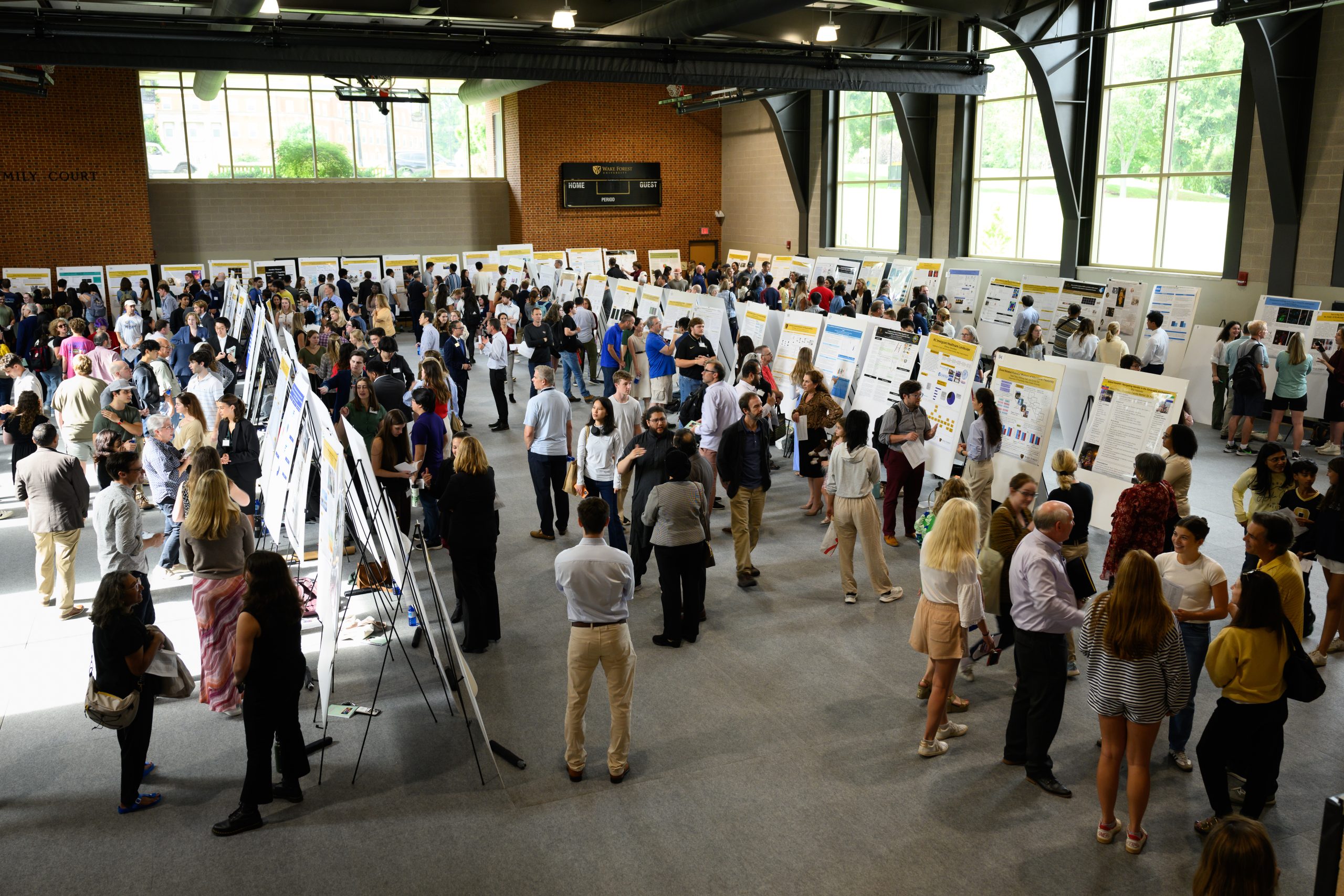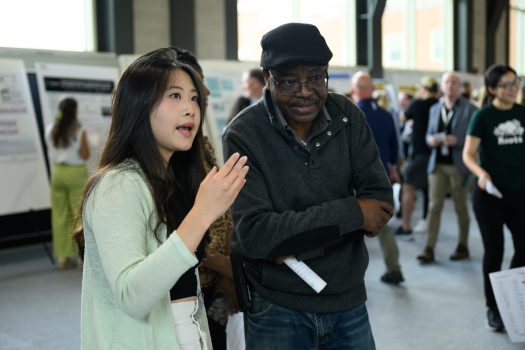Wake Forest students shine at URECA Day
Event highlights undergraduate, faculty-mentored research collaborations

Anthropology major Annelise Witcher offers a welcoming smile as passers-by stroll through row after row of posters on easels. At her feet are several 3D models of objects from the Lam Museum of Anthropology. She and her mentor Andrew Gurstelle, the museum’s director, created these in part to increase accessibility for museum visitors. “Go ahead, it’s okay to pick them up,” Witcher tells an interested attendee.
From chemistry to communication and engineering to English, students teamed up with faculty mentors on research projects funded by grants from Wake Forest’s Undergraduate Research and Creative Activities Center (URECA).
Over Family Weekend, hundreds of family, friends, faculty, staff and students walked through the Sutton Center, listening to students present their recently completed and ongoing research projects in poster and oral presentations.
The excitement of presenting their findings is “fueled by many other days of hard work and dogged determination,” said psychology professor and URECA director Wayne Pratt.
“URECA Day showcases the creative work and scholarly inquiry that can happen when faculty and students work together to develop new ideas and explore new questions,” Pratt said. “It is a celebration of the work, the student-scholars and the mentors that guide them.”
This year, over 130 undergraduate students and 120 faculty mentors participated in the event. More than 30 unique majors were represented at URECA Day.

Jamie Wu, a junior health and exercise science major, worked with professor of health and exercise science professor Kristin Beavers on research to see if older overweight adults who performed bone-loading exercises regularly might stave off osteoporosis and improve bone density. One of the exercises, single leg hop/heel drops, had participants using a weighted vest. Wu plans to become a physical therapist.
“Professor Beavers and I developed a relationship,” Wu said. “Because of our work together, she is able to provide recommendations, share about my skills and help me build for my future as I apply for physical therapy schools.”
“With the protected time afforded by the URECA fellowship, it is exciting to see Jamie take the next step in her research training, transitioning from a hands-on experiential learning opportunity to beginning to think independently about a scientific question, critically review relevant literature, and ultimately generate and interpret her own data,” said Beavers.
As research faculty member, Beavers said she views this experience as a win-win. “The students get an opportunity to work 1-on-1 with a faculty member to learn about and contribute to an active area of research… that quite honestly might not get moved forward without the energy and enthusiasm they bring to the table.”
Senior psychology major Brody Leo and his mentor psychology professor Christian Waugh collaborated on research studying the brain’s neural mechanisms to investigate if there could be ways to help people who struggle with reframing – a strategy for regulating emotions.
“The idea of mapping human experiences was like magic to me,” said Leo. “I went to Dr. Waugh’s office and asked how I could get involved. Our project uses MRI scanning to look at what’s going on in the brain in hopes that someday we can better help people who may have trouble changing how they think about a particular situation.”
Engineering major Jacob Louie worked on research that may someday help restore function to people with limb loss or motor dysfunction. Politics major Margaret Linker conducted surveys to study the link between candidate gender and voter support for corrupt candidates.
The undergraduate research experience through URECA often extends beyond Family Weekend. Some students continue to work with a faculty mentor, go to conferences and present research with their mentors or end up as co-authors on research papers.
Approximately one out of every 12 undergraduate students crossing the stage at commencement in 2025 will have had an opportunity to present at an Undergraduate Research Day during their time at Wake Forest.
Over the nearly two decades since URECA was launched, more than 900 students and their mentors have collaborated on funded research projects.
Learn more about 2024 student researchers and their work with faculty mentors in the social videos and photo story below.
- Meet health and exercise science major Kyle Alves, whose research looked at possible relationships between high-intensity interval resistance training and improved cognition in adults 65 and older. View Kyle’s video.
- Meet environmental science major Kirstin Murr and learn about her research with engineering professor Lauren Loman on methods to study fog and measure it accurately. View Kirstin’s video.
- To view the photo story “Research: A catalyst for change,” click here.
- To view the full URECA research book, click here.
Categories: Experiential Learning, Mentorship, Research & Discovery
Media Contact
Kim McGrath
media@wfu.edu
336.758.5237



